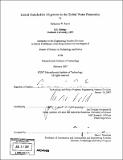| dc.contributor.advisor | Joel Cutcher-Gershenfeld. | en_US |
| dc.contributor.author | Parrot, Katherine W | en_US |
| dc.contributor.other | Massachusetts Institute of Technology. Technology and Policy Program. | en_US |
| dc.date.accessioned | 2008-02-27T22:16:01Z | |
| dc.date.available | 2008-02-27T22:16:01Z | |
| dc.date.copyright | 2007 | en_US |
| dc.date.issued | 2007 | en_US |
| dc.identifier.uri | http://hdl.handle.net/1721.1/40374 | |
| dc.description | Thesis (S.M.)--Massachusetts Institute of Technology, Engineering Systems Division, Technology and Policy Program, 2007. | en_US |
| dc.description | Includes bibliographical references (p. 149-150). | en_US |
| dc.description.abstract | This research evaluates stakeholder alignment in a global multi-stakeholder organization called the Global Water Partnership (GWP). The GWP represents a new breed of organization, a Global Multi-Stakeholder Network Organization (GMSNO), that has emerged in greater numbers in the last fifteen years as a means of addressing complex global social and environmental issues. This master's thesis adds to the body of literature on evaluation and assessment of these new global multi-stakeholder organizations by applying the Lateral Alignment Framework to study three different levels of stakeholder alignment in the GWP: Behavioral, Functional/Structural, and Systems/Culture/Values, and the GWP's effectiveness in achieving its mission and goals. The thesis has implications for GMSNOs in general both terms of the content of the findings and the method of analysis using the Lateral Alignment Framework. A main finding from this research is the difference between the relatively high frequency and quality of interactions within GWP regions compared to the low scores on interactions across global regions. | en_US |
| dc.description.abstract | (cont.) This finding may be generalizable to other GMSNOs. Another main finding is the difference between the value that stakeholders derive from GWP participation in a relatively well-developed economic region (a lower score) compared to two less developed regions (higher scores). This may indicate that the GWP is needed or valued for different kinds of functions in more-developed areas compared to less-developed regions. Generally, GWP stakeholders believe they are under-resourced for IWRM planning and management, and they typically see other organizations and regions as having more resources than they do. There is substantial variance in stakeholders' opinions of the existence of appropriate regional and global forums for them to meet and exchange ideas and information. Statistical tests show that these forums are important in facilitating stakeholder communication and alignment, and contributing to the effectiveness of the GWP in achieving its goals. There is a moderate to high level of agreement on the concept of Integrated Water Resources Management (IWRM). | en_US |
| dc.description.abstract | (cont.) This is a positive and significant finding for the GWP, since one of its primary aims is to develop the subject of IWRM among its partner organizations and at the global policy level. Other variables that asked stakeholders to assess the importance of the GWP to their organizations, and the value and effectiveness of the GWP in advancing IWRM at a global level, score high. These findings demonstrate the importance and the value of the GWP to its members. | en_US |
| dc.description.statementofresponsibility | by Katherine W. Parrot. | en_US |
| dc.format.extent | 191 p. | en_US |
| dc.language.iso | eng | en_US |
| dc.publisher | Massachusetts Institute of Technology | en_US |
| dc.rights | M.I.T. theses are protected by copyright. They may be viewed from this source for any purpose, but reproduction or distribution in any format is prohibited without written permission. See provided URL for inquiries about permission. | en_US |
| dc.rights.uri | http://dspace.mit.edu/handle/1721.1/7582 | |
| dc.subject | Technology and Policy Program. | en_US |
| dc.title | Lateral stakeholder alignment in the Global Water Partnership | en_US |
| dc.type | Thesis | en_US |
| dc.description.degree | S.M. | en_US |
| dc.contributor.department | Massachusetts Institute of Technology. Engineering Systems Division | |
| dc.contributor.department | Technology and Policy Program | |
| dc.identifier.oclc | 190864813 | en_US |
